Imagine getting expert pediatric advice without leaving your home, no traffic, no queues, and no cranky toddlers in crowded clinics. This is not the future; it’s happening now through telemedicine, a modern solution to many of the struggles parents face when accessing healthcare for their children.
Telemedicine uses digital technology (phones, video calls, apps) to provide medical care remotely. Since the COVID-19 pandemic, its use has skyrocketed, especially in pediatrics. But is it really effective? Is it safe? And when should you still go to a clinic?
What is Telemedicine in Pediatrics?
Telemedicine refers to the delivery of healthcare services remotely using technology—like video consultations, phone calls, or messaging apps. In pediatric care, this can include:
- Virtual sick visits (fever, rashes, coughs)
- Follow-up after hospitalization or surgery
- Mental health counseling
- Nutrition and growth consultations
- Speech therapy and developmental support
- Prescription refills and remote monitoring
Types of Telemedicine Services:
- Synchronous (Live video visits)
- Asynchronous (Store-and-forward data like images or reports)
- Remote Patient Monitoring (e.g., temperature, glucose levels from home devices)
Why Telemedicine is a Game-Changer for Parents
1. Convenience
Parents save time, travel costs, and missed workdays. Virtual visits can happen during lunch breaks or nap times.
2. Faster Access to Specialists
In India and globally, there is a shortage of pediatric subspecialists. Telemedicine bridges the gap by offering virtual consultations with pediatric neurologists, cardiologists, etc.
3. Better Chronic Care
Conditions like asthma, allergies, ADHD, or epilepsy require regular monitoring. Telemedicine supports continuity without the hassle of repeated clinic visits.
4. Emotional Ease
Children often feel safer in their own homes. This reduces anxiety, especially in children with sensory sensitivities or neurodivergent conditions.
When is Telemedicine NOT Enough?
Telemedicine is powerful, but not a replacement for emergency care. Parents should seek in-person help when their child:
- Has difficulty breathing
- Shows signs of dehydration (sunken eyes, dry mouth, no urine)
- Is unconscious, seizing, or non-responsive
- Has a high fever in a newborn (<3 months)
- Has a rash that spreads rapidly with fever (e.g., meningitis suspicion)
Always trust your instincts; if something feels wrong, go to the hospital.
What to Expect During a Pediatric Telemedicine Visit
Here’s how to prepare:
| Before the Visit | During the Visit | After the Visit |
| Note symptoms, duration, temperature, medications tried | Ensure good lighting and quiet space | Get a digital copy of the prescription or report |
| Have your child near you | Speak clearly, ask all your concerns | Follow up as suggested by the doctor |
| Keep previous medical records ready | Show rashes or injuries on camera if possible | Track your child’s response to treatment |
Common Parent Concerns
Is it safe?
Yes, when done by licensed pediatricians through secure platforms.
Can doctors really diagnose on camera?
For many mild to moderate illnesses, yes. Doctors can guide you to show specific movements, rashes, breathing patterns, etc.
What about prescriptions?
Doctors can send e-prescriptions via WhatsApp, email, or app portals.
Is my data safe?
Always use certified platforms (e.g., Practo, Apollo 24/7, Tata Health, MyHealthBuddy) to protect your child’s information.
Real-Life Use Cases in India
- Rural Telemedicine Camps: Government initiatives and NGOs are using teleconsults in remote villages to improve neonatal care and vaccinations.
- Urban Working Parents: Teleconsultations offer flexibility for parents who juggle work, school runs, and caregiving.
- Speech Therapy: Virtual sessions for speech-delayed toddlers are showing comparable success to in-clinic therapy, especially when parents are involved.
What Does the Research Say?
Here are some evidence-based findings:
- A 2023 systematic review in Pediatrics (AAP) showed that telemedicine is comparable to in-person visits for common pediatric conditions like URIs, skin infections, and conjunctivitis.
- PubMed study (PMID: 36693972): Pediatric teleconsults had high patient satisfaction and improved access, especially in areas with doctor shortages.
- Lancet Digital Health 2022: Telemedicine in neonatal and postnatal care improved follow-up rates and early intervention outcomes.
- Indian Pediatrics Journal (2022): Emphasized telehealth’s role in managing pediatric epilepsy and ADHD with minimal complications and better parent involvement.
Tips for Parents New to Telemedicine
- Keep a health diary: symptoms, triggers, fever logs
- Invest in a basic thermometer, weighing scale, and flashlight for mouth/throat inspection
- Use headphones for privacy during behavioral or mental health visits
- Ask your pediatrician if they offer teleconsultation options before emergencies arise
The Future: What’s Next for Pediatric Telemedicine?
With 5G, AI diagnosis, and smart home devices, telemedicine will soon:
- Predict fevers or infections before symptoms appear
- Guide CPR or first aid through augmented reality
- Support postnatal care for mothers and newborns
- Expand government and CSR-driven rural programs
Final Takeaway
Telemedicine isn’t here to replace your child’s pediatrician; it’s here to bring them closer when time, distance, or logistics get in the way. For many Indian families, especially working parents and rural communities, it’s proving to be a lifesaver, time-saver, and stress-saver.
The key is knowing when to use it and when not to. Stay informed, stay prepared, and embrace this technology as a partner in your parenting journey.





Be the first one to comment on this story.